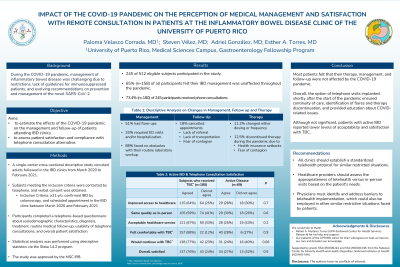Tuesday Poster Session
Category: IBD
P3610 - Impact of the COVID-19 Pandemic on the Perception of Medical Management and Satisfaction With Remote Consultation in Patients at the Inflammatory Bowel Disease Clinic of the University of Puerto Rico
Tuesday, October 24, 2023
10:30 AM - 4:00 PM PT
Location: Exhibit Hall

Has Audio
- PV
Paloma M. Velasco, MD
University of Puerto Rico
Guaynabo, PR
Presenting Author(s)
Paloma Velasco, MD1, Steven Velez, MD2, Adriel Gonzalez, MD2, Esther A. Torres, MD2
1University of Puerto Rico, Guaynabo, Puerto Rico; 2University of Puerto Rico, San Juan, Puerto Rico
Introduction: During the COVID-19 pandemic, management of inflammatory bowel disease was challenging due to restrictions, lack of guidelines for immunosuppressed patients, and evolving information of the novel SARS-CoV-2. Since the start of the pandemic, our IBD clinic established a telephone-based consultation system with strict and limited access to in-person visits. Our study aims to estimate the effects of the pandemic on the management and follow-up of patients attending our clinics as well as to assess patient satisfaction with telephone consultations.
Methods: A single-center cross-sectional descriptive study recruited adults followed in the IBD clinics from March 2020 to February 2021. Subjects meeting the inclusion criteria were contacted by telephone, and verbal consent was obtained. Participants completed a telephone-based questionnaire based on sociodemographic characteristics, diagnosis, treatment, follow-up, usability of telephone consultations, and overall satisfaction. Statistical analysis was performed using descriptive statistics via Stata 14.2 program.
Results: 245 of 512 subjects participated in the study; the majority were female (54.2%), the mean age was 41.7 and most (68.4%) had Crohn’s Disease. 73.4% of 245 participants received phone consultations, while 8.7% were seen in person or lost to follow-up and 17.9% disclosed canceling appointments mainly due to fear of contagion, healthcare setbacks, and distrust of telephone consultations. 64% of subjects that received phone consultations referred improved access to medical attention, 76% disclosed satisfaction and 76.6% stated they would continue with this alternative. Out of the 245 subjects, 85.3% were receiving therapy in March 2020, however, 11.2% changed either dosing or frequency and 12.5% discontinued therapy during the pandemic due to health insurance setbacks, lack of physician evaluation, and fear of contagion. 64.7% of all participants felt their IBD management was not affected throughout the pandemic.
Discussion: This study shows that most of the patients appeared satisfied with access to specialized care during the pandemic. The option of telephone visits implanted shortly after the start of the pandemic ensured continuity of care, identification of flares and therapy discontinuation, as well as provided education about COVID-related issues. Barriers to remote access should be identified to increase the availability of this option, which could also be employed in other similar restrictive situations faced by patients.
Disclosures:
Paloma Velasco, MD1, Steven Velez, MD2, Adriel Gonzalez, MD2, Esther A. Torres, MD2. P3610 - Impact of the COVID-19 Pandemic on the Perception of Medical Management and Satisfaction With Remote Consultation in Patients at the Inflammatory Bowel Disease Clinic of the University of Puerto Rico, ACG 2023 Annual Scientific Meeting Abstracts. Vancouver, BC, Canada: American College of Gastroenterology.
1University of Puerto Rico, Guaynabo, Puerto Rico; 2University of Puerto Rico, San Juan, Puerto Rico
Introduction: During the COVID-19 pandemic, management of inflammatory bowel disease was challenging due to restrictions, lack of guidelines for immunosuppressed patients, and evolving information of the novel SARS-CoV-2. Since the start of the pandemic, our IBD clinic established a telephone-based consultation system with strict and limited access to in-person visits. Our study aims to estimate the effects of the pandemic on the management and follow-up of patients attending our clinics as well as to assess patient satisfaction with telephone consultations.
Methods: A single-center cross-sectional descriptive study recruited adults followed in the IBD clinics from March 2020 to February 2021. Subjects meeting the inclusion criteria were contacted by telephone, and verbal consent was obtained. Participants completed a telephone-based questionnaire based on sociodemographic characteristics, diagnosis, treatment, follow-up, usability of telephone consultations, and overall satisfaction. Statistical analysis was performed using descriptive statistics via Stata 14.2 program.
Results: 245 of 512 subjects participated in the study; the majority were female (54.2%), the mean age was 41.7 and most (68.4%) had Crohn’s Disease. 73.4% of 245 participants received phone consultations, while 8.7% were seen in person or lost to follow-up and 17.9% disclosed canceling appointments mainly due to fear of contagion, healthcare setbacks, and distrust of telephone consultations. 64% of subjects that received phone consultations referred improved access to medical attention, 76% disclosed satisfaction and 76.6% stated they would continue with this alternative. Out of the 245 subjects, 85.3% were receiving therapy in March 2020, however, 11.2% changed either dosing or frequency and 12.5% discontinued therapy during the pandemic due to health insurance setbacks, lack of physician evaluation, and fear of contagion. 64.7% of all participants felt their IBD management was not affected throughout the pandemic.
Discussion: This study shows that most of the patients appeared satisfied with access to specialized care during the pandemic. The option of telephone visits implanted shortly after the start of the pandemic ensured continuity of care, identification of flares and therapy discontinuation, as well as provided education about COVID-related issues. Barriers to remote access should be identified to increase the availability of this option, which could also be employed in other similar restrictive situations faced by patients.
Disclosures:
Paloma Velasco indicated no relevant financial relationships.
Steven Velez indicated no relevant financial relationships.
Adriel Gonzalez indicated no relevant financial relationships.
Esther Torres indicated no relevant financial relationships.
Paloma Velasco, MD1, Steven Velez, MD2, Adriel Gonzalez, MD2, Esther A. Torres, MD2. P3610 - Impact of the COVID-19 Pandemic on the Perception of Medical Management and Satisfaction With Remote Consultation in Patients at the Inflammatory Bowel Disease Clinic of the University of Puerto Rico, ACG 2023 Annual Scientific Meeting Abstracts. Vancouver, BC, Canada: American College of Gastroenterology.
